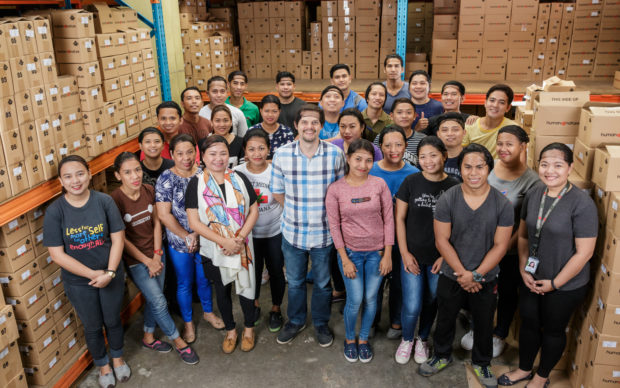Will social enterprises create the new middle class?

Dylan Wilk at the Human Nature warehouse
Despite economic gains in recent years and public-private campaigns towards job creation and entrepreneurship, many working Filipinos remain in poverty due to low-quality jobs that don’t pay enough to meet basic needs, nor provide any training to upskill or job security for the worker and his family.
If we are to make any progress in eradicating poverty in the Philippines, society must find a way to move up the working poor into the middle class.
Inclusive businesses, due to their sustainable for-profit model, can offer large scale, systemic solutions to social ills.
Human Nature had its beginnings in 2008 with three cofounders who have their roots in the non-profit sector.
This writer and sister Camille Meloto are daughters of GK (Gawad Kalinga, which means to give care) founder, Tony Meloto, a mature non-profit in the Philippines that has set out to eliminate poverty by transforming slums into dignified communities.
Article continues after this advertisementWe came up with the idea to start Human Nature to provide sustainable livelihood to GK communities in farming communities by sourcing cosmetic ingredients for their personal care business.
Article continues after this advertisementTogether with my husband, Dylan Wilk, another GK volunteer, we founded the company with the values of being pro-Philippines, pro-poor and pro-environment.
Soon after we incorporated, we hired employees from poor areas in the city to populate our logistics, retail merchandising and manufacturing departments.
The low-skilled working poor make up 58 percent of Human Nature’s total employees.
This segment of workers go into the labor force with numerous inherent limitations: minimal education and skills, poor health and a value system that’s not geared towards optimal work.
It’s also common for the working poor to spend years moving from one manufacturing or sales company to another without being regularized.
Human Nature designed programs and interventions to address these inherent limitations and help the working poor rise to become part of the middle class.
These include providing above-minimum wage salaries, regularization for permanent positions, life skills to teach financial stewardship and navigating conflicts, calamity assistance, housing assistance, private health insurance and soon, a childcare facility for parent employees.
Starting a business means paying people the legal minimum as a compulsory requirement.
However, apart from the fact that many businesses don’t pay the minimum wage anyway, what the government itself requires is not enough for Filipinos to have a decent quality of life.
Recently, inflation rates have skyrocketed to 6.4 percent, the highest it has been in nine years and minimum wage is still at P512, barely enough to cover basic goods as the prices are becoming out of reach for wage earners.
We believe in paying a living wage instead of just meeting the required minimum wage.
Since 2008 when Metro Manila minimum wage was only at P383/day, the company had been paying 23 percent more with the goal of paying the living wage as the company improves profitability.
In the last 10 years, minimum wage has just increased 25 percent to P512 in Metro Manila although the living wage is now at P995/day.
Meanwhile, Human Nature as a company started paying regular employees P500/day in 2008 and over the last 10 years has steadily increased the internal minimum wage to P910 in 2018, putting the company’s minimum salary much closer to the 2018 living wage of P995/day.
Does it work and does it make business sense?
In 2017, Human Nature began working with the Institute for Social Entrepreneurship in Asia to measure the impact of Human Nature’s programs and policies on workers from poor communities.
The study found that GKI programs and policies have enabled 73 percent of workers from the working poor to enjoy dignified work, decent standard of living, freedom from usurious debts and better financial management.
Clearly, Human Nature’s progressive business policies are working to address poverty and move up their people towards becoming members of the new middle class.
The policies seem to also make business sense since the company has posted double-digit growth year-on-year since 2008. We now employ almost 500 employees in three work sites, operate 34 branches, distributed in supermarkets and are present in five countries abroad.
Social enterprises are no longer just start-ups or charities posing as for-profit businesses anymore.
Any business can become a social enterprise by seeing its role not just to make profit but as a way of decreasing the number of employed poor and moving them up to create the new middle class. —CONTRIBUTED